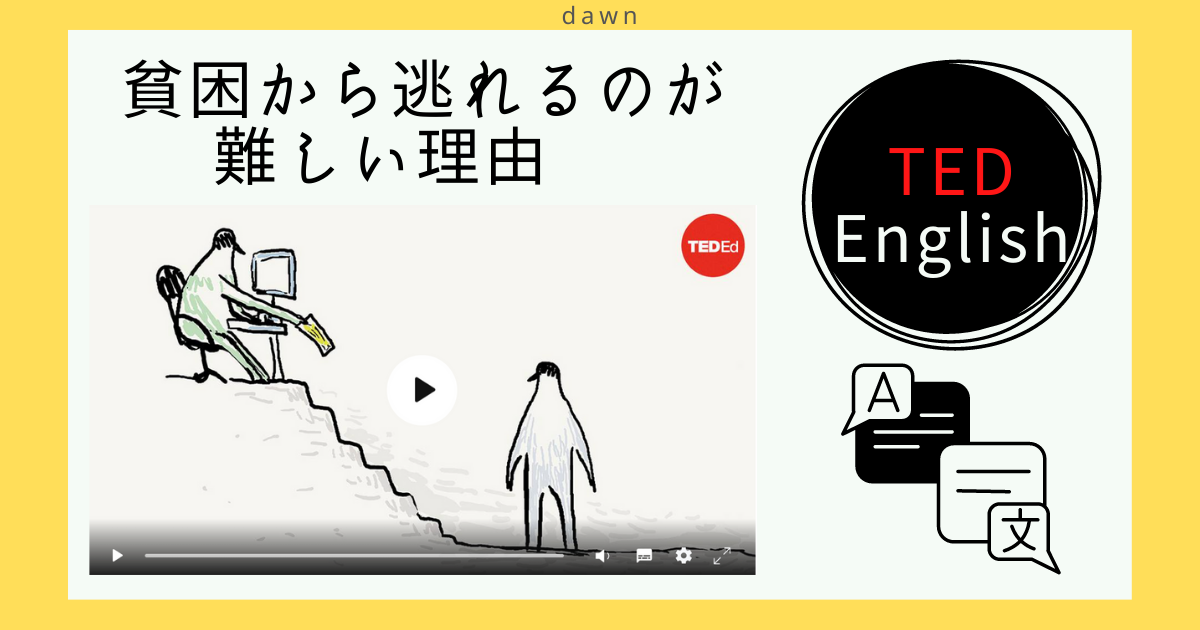今回の記事ではTEDより「貧困から逃れるのが難しい理由」の英語/日本語のスクリプト、気になったボキャブラリーをまとめています。
動画
動画概要(公式)
あなたが何か月も失業中のところを想像してください。政府の福利厚生制度で あなたは出費を賄っていますが、なんとかやっていくのに精一杯です。ついに、あなたは給料を受け取りますが、落とし穴があります。あなたの新しい仕事の給料の額はちょうど福祉制度を受ける資格がなくなる額ですが、出費を賄える額ではありません。では、どうすれば人々が働いても不利にならないように給付金を作り直せるでしょうか?アン=ヘレン・ベイが探求します。 監督:アヴィ・オフェル、ナレーション:クリスティーナ・グリア、音楽:サリル・バヤニ cAMP Studio
英語・日本語スクリプト/ボキャブラリー
00:07
Imagine that you’ve been unemployed and seeking work for months.あなたが失業中で 何か月も職を 探しているところを想像してください
Government benefit programs have helped you cover rent, utilities, and food, but you’re barely getting by.
政府の福利厚生制度で あなたは 家賃、光熱費、食費を賄っていますが なんとかやっていくのに精一杯です
getting by
どうにか暮らす
(言語・科目などで) まあまあ[そこそこ]できる,
(限られた条件のもとなどで) 何とかやっていく
Finally, you hear back about a job application.
ついに あなたは求職申し込みに対する 返事を受け取ります
You receive your first paycheck in months, and things seem to be turning around.
あなたは ここ数か月で初めての給料を 受け取り 事態は好転し始めたようです
But there’s a catch.
でも 落とし穴があります
Your new job pays just enough to disqualify you from the benefit programs, and not enough to cover the same costs.
あなたの新しい仕事の給料の額はちょうど 失業手当を受ける資格がなくなる額ですが 手当で支払っていた費用を 賄える額ではありません
To make things worse, you have to pay for transportation to work, and childcare while you’re at the office.
さらに悪いことには あなたは通勤のための交通費や 出勤中の子供の保育費を 負担しなければなりません
Somehow, you have less money now than when you were unemployed.
どういうわけか あなたは無職だったときより 少ないお金しか手にできません
00:41
Economists call this demoralizing situation the welfare trap— one of the many different poverty traps affecting millions of people around the world.経済学者は このやる気をなくさせる状態を 福祉の罠と呼びます 世界中の数百万の人々に影響を及ぼしている 数ある貧困の罠の ひとつです
demoralizing
<事が> やる気をそぐような, 自信をなくすような, 士気を下げるような
demoralize
<人> の気勢[やる気]をそぐ, 士気を低下させる
Poverty traps are economic and environmental circumstances that reinforce themselves, perpetuating poverty for generations.
貧困の罠は 自ら力を強め 何世代にもわたって貧窮を継続させる ― 経済的および環境的な状況なのです
reinforce
<論点・意見など> を補強する, <感情など> をさらに強める
<悪い状況など> を助長する
perpetuating
<特に悪い状況・性質など> を存続させる
Some poverty traps are tied to an individual’s circumstances, like a lack of access to healthy food or education.
貧困の罠の中には 個々人の事情に関係しているものがあります たとえば 健康的な食べ物や教育を 得られないなどです
Others can affect entire nations, such as cycles of corrupt government or climate change.
また国全体に 影響しているものもあります 繰り返される政権の腐敗や 気候変動などです
But the cruel irony of welfare traps in particular is that they stem from the very policies designed to battle poverty.
しかし福祉の罠の とりわけ残酷な皮肉は まさに 貧困と闘うための政策から 生まれたものであるということです
stem from
[句動詞](事態・問題などが) <…>から生じる, に由来する
01:15
Most societies throughout history employed some strategies to help people in poverty meet basic needs.歴史上 ほとんどの社会は 何らかの戦略を立てて 貧しい人にとって 基本的に必要なものを支援をします
Before the 20th century, religious groups and private charities often led such initiatives.
20世紀より前には 主に宗教団体や民間の慈善団体が そのような活動を行っていました
Today, these are called welfare programs, and they usually take the form of government-provided subsidies for housing, food, energy, and healthcare.
今日 これらは福祉制度と呼ばれて 通常 政府による家賃、食費 光熱費、医療費に対する 補助金という形を取ります
Typically, these programs are means-tested, meaning that only people who fall below a certain income level are eligible for benefits.
通常 これらの制度の適用は 収入により判断されます つまり ある一定の収入水準を 下回る人だけが 恩恵にあずかれるのです
This policy is designed to ensure aid goes to those who need it most.
この政策は 援助を最も必要としている人に 届くよう設計されています
But it also means people lose access as soon as they earn more than the qualification threshold, regardless of whether or not they’re financially stable enough to stay there.
しかし このことはまた 援助を受ける 資格の基準値より稼いだとたんに 援助がなくなることを意味しており 安定して基準値を上回るかは考慮されません
threshold
基準, 水準
(反応を起こす) 限界, 境界, (心理学で) 閾(いき)
the threshold 敷居, 入り口, 玄関口
01:57
This vicious cycle is harmful to both those in poverty and those outside of it.このような悪循環は貧困状態にある人と そうでない人の両方にとって有害です
Mainstream economic models assume people are rational actors who weigh the cost and benefits of their options and choose the most advantageous path forward.
主流派経済モデルでは 人は合理的行為者 ― つまり 選択肢のコストと利益を比較し 先行きが最も有利なものを 選ぶ者としています
If those in poverty know they’ll gain no net benefit from working, they’re incentivized to remain in government assistance.
貧困状態にある人が 働いても利益を 得られないとわかっていれば 政府の援助が得られる状態に留まる 動機づけになります
net
(数量などが) 正味の, 純…
a net profit純益
Of course, people work for many reasons, including societal norms and personal values.
もちろん 人が働く理由は様々です 社会規範や個人的価値という 理由もあるでしょう
But income is a major incentive to pursuing employment.
しかし 収入は 職を求める 主な動機となります
And when less people take on new jobs, the economy slows down, keeping people in poverty and potentially pushing people on the cusp of poverty over the edge.
新たな職に就く人が少ないと 経済は停滞して 貧困状態の人はそのままで 貧困の一歩手前にいる人を 貧困へと追いやる可能性があります
cusp
〘専門〙 (2曲線が交わる) 尖点(せんてん)
02:35
Some have suggested this feedback loop could be removed by eliminating government assistance programs altogether.政府の援助制度を 全て廃止することによって この悪循環をなくすことが できるという人もいました
But most agree the solution is neither realistic nor humane.
しかし 多くの人は この解決策が 現実的でなく人道的でないと考えています
So how can we redesign benefits in a way that doesn’t penalize people for working?
ではどうすれば 働く人に不利にならない 給付金制度へと作り直せるでしょうか?
penalize
…を罰する
(スポーツで) <チーム・選手など> にぺナルティーを科す
Many countries have tried different ways to circumvent this problem.
多くの国では この問題を回避するために いろいろな取り組みを行ってきました
circumvent
<法律・規則など> をすり抜ける, の裏をかく, <問題・困難など> を巧みに回避す
<障害物など> を迂回(うかい) する, 避けて通る 同意 avoid
Some allow people to continue receiving benefits for a given period after finding a job, while others phase out benefits gradually as income increases.
ある国では 仕事が見つかった後も ある一定期間 給付金の受給が できるようにしていますまた 収入の増加に従って 給付金を減らす国もあります
These policies still remove some financial incentive to work, but the risk of a welfare trap is lower.
これらの施策はなおも金銭的な面で 働く意欲を多少削いでいますが 福祉の罠のリスクは低減できます
Other governments provide benefits like education, childcare, or medical care equally across all their citizens.
教育費、保育費、医療費といった給付金を すべての市民に平等に 給付している政府もあります
03:18
One proposed solution takes this idea of universal benefits even further.提案されているある解決策では 普遍的給付の考え方をさらに押し進めています
A universal basic income would provide a fixed benefit to all members of society, regardless of wealth or employment status.
最低所得保障は社会の全ての構成員に 一定の給付金を 資産や就労の状況にかかわらず 給付するものです
This is the only known policy that could entirely remove welfare traps, since any earned wages would supplement the benefit rather than replace it.
これは知られる限り福祉の罠を 完全に取り除けるかもしれない唯一の政策です 稼いだお金が給付金の代替とはならず 給付金を補完するからです
In fact, by creating a stable income floor below which no one can fall, basic income might prevent people from falling into poverty in the first place.
実際 誰もがそれ以下にならない 安定した収入の下限を設けることで 最低所得保障は そもそも人が貧困に陥ることを防ぎます
03:47
Numerous economists and thinkers have championed this idea since the 18th century.数多くの経済学者や思想家が 18世紀以来 この考えを 支持してきました
championed
〘書き言葉〙 <主義・権利など> のために闘う, を擁護する
But for now, universal basic income remains largely hypothetical.
しかし今のところ 最低所得保障は ほとんど仮想的です
hypothetical
<状況などが> 例えばの, 仮定の, 想定できる
hypothesis
《C》 仮説
《U》 仮定, 推測
Although it’s been tried in some places on a limited scale, these local experiments don’t tell us much about how the policy would play out across an entire nation— or a planet.
いくつかの場所で 限られた規模で試されたことはありますが これらの局所的な試みでは 国全体 あるいは全世界で この政策を実施したら どうなるかは分かりません
04:07
Whatever strategy governments pursue, solving the welfare trap requires respecting people’s agency and autonomy.政府が追い求める戦略がどうであれ 福祉の罠を解決するためには人々の主体性や 自主性を尊重することが求められます
autonomy
(地域・国などの) 自治(権)
(人の) 自立性, 自主性
Only by empowering individuals to create long-term change in their lives and communities can we begin to break the cycle of poverty.
生活や共同社会において 長期的な変化を起こす力を 個々人に与えることだけが 貧困の循環を断ち切る端緒になるのです
英語学習におけるTEDの活用方法
僕がTEDを利用する際、以下のような手順で使っています。
①興味ある分野から動画を選ぶ
②字幕なしで動画を見る
③字幕ありで動画を見る
④知らない単語を調べる
⑤音読する
TEDは無料でスクリプトも公開されていますし、無料なのに機能性がとても高いです。その上、動画のプレゼンの内容自体が学びになるので英語学習にオススメです。
また、スマホ用アプリでおすすめなのが「TEDICT LITE」。
TEDのWebページだとだ字幕は英語か日本語の片方しか出ませんが、「TEDICT LITE」は日・英の字幕が同時に出ます。僕が調べて掲載している動画で使用されるボキャブラリーもまとまっています。
有料版の「TEDICT」もありますが、まずは「TEDICT LITE」をお試しください。
参考資料
ロングマン英和辞典
※英単語は全てロングマン英和辞典から引用しています。








コメント